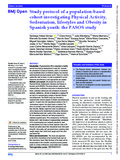Mostrar el registro sencillo del ítem
Study protocol of a population-based cohort investigating physical activity, sedentarism, lifestyles and obesity in Spanish youth: the PASOS study
| dc.creator | Gómez, Santiago F. | es_ES |
| dc.creator | Homs, Clara | es_ES |
| dc.creator | Wärnberg, Julia | es_ES |
| dc.creator | Medrano Echeverría, María | es_ES |
| dc.creator | Labayen Goñi, Idoia | es_ES |
| dc.date.accessioned | 2021-01-27T12:17:57Z | |
| dc.date.available | 2021-01-27T12:17:57Z | |
| dc.date.issued | 2020 | |
| dc.identifier.issn | 2044-6055 (Electronic) | |
| dc.identifier.uri | https://hdl.handle.net/2454/39088 | |
| dc.description.abstract | Introduction Physical activity (PA) is essential to healthy mental and physical development in early life. However, the prevalence of physical inactivity, which is considered a key modifiable driver of childhood obesity, has reached alarming levels among European youth. There is a need to update the data for Spain, in order to establish if current measures are effective or new approaches are needed. Methods and analysis We present the protocol for Physical Activity, Sedentarism, lifestyles and Obesity in Spanish youth (PASOS). This observational, nationally representative, multicentre study aims to determine the PA levels, sedentary behaviours and prevalence of physical inactivity (defined as <60 min of moderate to vigorous PA per day) in a representative sample of Spanish children and adolescents. The PASOS study has recruited a representative random sample of children and adolescents aged 8-16 years from 242 educational centres in the 17 'autonomous regions' into which Spain is divided. The aim is to include a total of 4508 youth participants and their families. Weight, height and waist circumference will be measured by standardised procedures. Adherence to the Mediterranean diet, quality of life, sleep duration, PA and sedentary behaviour are being measured by validated questionnaires. PA is measured by the Physical Activity Unit 7-item Screener. A representative subsample (10% of participants) was randomly selected to wear accelerometers for 9 days to obtain objective data on PA. Parents are asked about their educational level, time spent doing PA, diet quality, self-perceived stress, smoking habit, weight, height, their child's birth weight and if the child was breast fed. | en |
| dc.description.sponsorship | PASOS study has been funded mainly by Fundación PROBITAS and Gasol Foundation. Additional funds were received from the Barça Foundation, Banco Santander, IFA, Viena and Fundación Deporte Jóven. MMB is funded by the official funding agency for biomedical research of the Spanish government, Institute of Health Carlos III (ISCIII), which is cofunded by the European Regional Development Fund (CIBEROBN CB12/03/30038), grant of support to research groups number 35/2011 (Balearic Islands Gov) and EU COST Action CA16112. PASOS has the institutional support of Spain’s Ministry of Education and Vocational Training, the Ministry of Health, Consumption and Social Welfare through the Spanish Agency for Food Safety and Nutrition (ASEAN), the High Commission against Child Poverty, the High Sports Council, the General College of Professional Associations of Physical Education and Sports, and the Departments of Education and/or Health and/or Sports of Spain’s 17 autonomous regions. The CIBERESP and the CIBEROBN are initiatives of the Institute of Health Carlos III, Madrid, Spain. | en |
| dc.format.extent | 6 p. | |
| dc.format.mimetype | application/pdf | en |
| dc.language.iso | eng | en |
| dc.publisher | BMJ | en |
| dc.relation.ispartof | BMJ Open, 2020, 10:e036210 | en |
| dc.rights | This is an open access article distributed in accordance with the Creative Commons Attribution Non Commercial (CC BY-NC 4.0) license, which permits others to distribute, remix, adapt, build upon this work non-commercially, and license their derivative works on different terms, provided the original work is properly cited, appropriate credit is given, any changes made indicated, and the use is non-commercial. | en |
| dc.rights.uri | http://creativecommons.org/ licenses/by-nc/4. 0/ | |
| dc.subject | Community child health | en |
| dc.subject | Epidemiology | en |
| dc.subject | Public health | en |
| dc.title | Study protocol of a population-based cohort investigating physical activity, sedentarism, lifestyles and obesity in Spanish youth: the PASOS study | en |
| dc.type | info:eu-repo/semantics/article | en |
| dc.type | Artículo / Artikulua | es |
| dc.contributor.department | Institute on Innovation and Sustainable Development in Food Chain - ISFOOD | es_ES |
| dc.rights.accessRights | info:eu-repo/semantics/openAccess | en |
| dc.rights.accessRights | Acceso abierto / Sarbide irekia | es |
| dc.identifier.doi | 10.1136/bmjopen-2019-036210 | |
| dc.relation.publisherversion | https://doi.org/10.1136/bmjopen-2019-036210 | |
| dc.type.version | info:eu-repo/semantics/publishedVersion | en |
| dc.type.version | Versión publicada / Argitaratu den bertsioa | es |
Ficheros en el ítem
Este ítem aparece en la(s) siguiente(s) colección(ones)
La licencia del ítem se describe como This is an open access article distributed in accordance with the
Creative Commons Attribution Non Commercial (CC BY-NC
4.0) license, which
permits others to distribute, remix, adapt, build upon this work non-commercially,
and license their derivative works on different terms, provided the original work is
properly cited, appropriate credit is given, any changes made indicated, and the use
is non-commercial.



